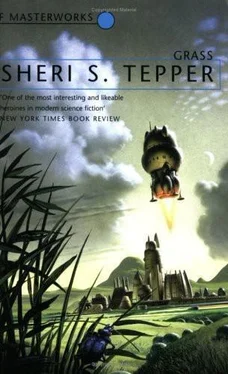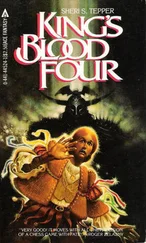“Marjorie.” Father James recalled her to herself. “I cut my hand upon a grass blade a few days ago, a bad cut. It hurt a great deal. Grass cuts do not seem to heal easily, either.”
“That’s true,” she murmured, familiar with the experience but wondering what he was getting at.
“It came to me suddenly as I was standing there bleeding all over the ground that I could see the cut there between my fingers but I could not heal it. I could observe it, but I couldn’t do anything about it even though I greatly desired to do so. I could not command the cells at the edges of the wound to close. I was not, am not privy to their operations I am too gross to enter my own cells and observe their function. Nor can you do so, nor any of us.
“But suppose, just suppose, that you could create… oh, a virus that sees and reproduces and thinks! Suppose you could send it into your body, commanding it to multiply and find whatever disease or evil there may be and destroy it. Suppose you could send these creatures to the site of the wound with an order to stitch it up and repair it. You would not be able to see them with your naked eye. You would be unable to know how many of them there were in the fight. You would not know where each one of them was or what it was doing, what agonies of effort each was expending or whether some gave up the battle out of fatigue or despair. All you would know is that you had created a tribe of warriors and sent it into battle. Until you healed or died, you would not know whether that battle was won.”
“I don’t understand, Father.”
“I wonder sometimes if this is what God has done with us.”
Marjorie groped for his meaning. “Wouldn’t that limit God’s omnipotence?”
“Perhaps not. It might be an expression of that omnipotence. In the microcosm, perhaps He needs — or chooses — to create help. Perhaps He has created help. Perhaps he creates in us the biological equivalent of microscopes and antibiotics.”
“You are saying God cannot intervene in this plague?” The invisible person beyond the grating sighed. “I am saying that perhaps God has already done his intervening by creating us. Perhaps He intends us to do what we keep praying He will do. Having designed us for a particular task, he has sent us into battle. We do not particularly enjoy the battle, so we keep begging him to let us off. He pays no attention because He does not keep track of us individually. He does not know where in the body we are or how many of us there are. He does not check to see whether we despair or persevere. Only if the body of the universe is healed will he know whether we have done what we were sent to do!” The young priest coughed. After a moment, Marjorie realized he was laughing. Was it at her, or at himself? “Do you know of the uncertainty principle, Marjorie?”
“I am educated,” she snorted, very much annoyed with him.
“Then you know that with very small things, we cannot both know where they are and what they are doing. The act of observing them always changes what they are doing. Perhaps God does not look at us individually because to do so would interrupt our work, interfere with our free will…”
“Is this doctrine, Father?” she asked doubtfully, annoyed, wondering what had come over him.
Another sigh. “No, Marjorie. It is the maundering of a homesick priest. Of course it isn’t doctrine You know your way around the catechism better than that.” He rubbed his head, thankful for the seal of the confessional. Even though Marjorie needed to take herself far less seriously, Father Sandoval would not appreciate what he had just said…
“If the plague kills us all, it will be because of our sins,” she said stubbornly. “Not because we didn’t fight it well enough. And our souls are immortal.”
“So Sanctity says. So the Moldies say,” he murmured. “They say we must all be killed off so our souls can live, in the New Creation.”
“I don’t mean we’re excused from fighting the plague,” she objected. “But it’s our sins that brought it on us.”
“Our sins? Yours and mine, Marjorie?
“Original sin,” she muttered. “Because of the sin of our first parents.” First parents very much like Rigo and Stella, passionately acting out whatever moved them, without thought. Even laughing, perhaps, as they tore the world apart. Never sober and reverent as they ought to be. Never peaceful. She sighed.
“Original sin?” the young priest asked, curious. At one time he had believed it without question, but he wasn’t sure anymore. There were some other catechetical things he wasn’t sure of, either. His doubt about doctrine should signal some crisis of faith, he thought, but his faith was as strong as it had ever been, even though his acceptance of details was wavering. “So you believe in original sin?”
“Father! It’s doctrine!”
“How about collective guilt? Do you believe in that?”
“What do you mean?”
“Are the bons guilty, collectively, for what happened to Janetta bon Maukerden?”
“Is that a doctrinal question?” she asked doubtfully.
“How about the Sanctified?” he asked. “Are they collectively guilty of condemning their boy children to prison? Young Rillibee, for example. Was he sent into servitude because of collective guilt, or because of original sin?”
“I’m an Old Catholic. I don’t have to decide where Sanctity went wrong, so long as I know it did!”
He kept himself from laughing. Oh, if only Marjorie had more humor. If Rigo had more patience. If Stella had more perception. If Tony had more confidence — And if Eugenie had more intelligence. Never mind their sins, just give them more of what they needed.
He sighed, rubbing the sides of his forehead to make the sullen ache go away, then gave her both absolution and a reasonable penance. She was to accept that Rigo would ride to hounds and she was to try not to judge him harshly. Father Sandoval had been sentencing Marjorie to affectionate support for years. Father James thought affectionate support was probably a bit much Marjorie, repentant but weary, ready to grit her teeth over yet another session of affectionate support, was surprised enough by the penance to accept it. She wouldn’t judge Rigo, but she needn’t support him, either. It was not until later, as evening drew on, that she remembered what Father James had said about thinking viruses and guilt and sin. Once she began considering the questions he had asked, she could not get them out of her mind.
In the chapel, meantime, Father James knelt to beg forgiveness for himself. It had been wicked of him to challenge Marjorie’s faith when what he was really wanting was to shore up his own. He was not at all sure that being nonjudgmental about Rigo was a good thing for Marjorie to do. If what the bons were doing was sinful, then Rigo had no business doing it at all. Rigo had convinced himself he was joining the bons in their obsession out of a sense of duty. Father James thought ego was the more likely reason, and Father Sandoval was too set in his ways to offer anything but cliches. Father James wished for Brother Mainoa to talk with. Or the younger one, Lourai. He had a feeling they shared a good many things besides their age.
In the night, a rhythmic thunder.
Marjorie woke and went walking through the halls of the residence, encountering Persun Pollut, himself stalking nervously from place to place, pulling his long ears, twisting his beard into tails.
“What is it?” she whispered. “I’ve heard it before, but never so close as this.”
“The Hippae, they say,” he murmured in return. “In the village, that’s what they say. Often in the spring they hear this sound, many times during the lapse. It woke me, so I came up here to the big house see that all of you were all right.”
Читать дальше












